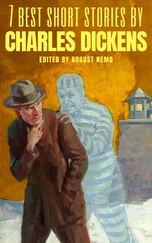Charles Dickens - Pearl-Fishing; Choice Stories from Dickens' Household Words; Second Series
Здесь есть возможность читать онлайн «Charles Dickens - Pearl-Fishing; Choice Stories from Dickens' Household Words; Second Series» — ознакомительный отрывок электронной книги совершенно бесплатно, а после прочтения отрывка купить полную версию. В некоторых случаях можно слушать аудио, скачать через торрент в формате fb2 и присутствует краткое содержание. ISBN: , Издательство: Иностранный паблик, Жанр: foreign_prose, на английском языке. Описание произведения, (предисловие) а так же отзывы посетителей доступны на портале библиотеки ЛибКат.
- Название:Pearl-Fishing; Choice Stories from Dickens' Household Words; Second Series
- Автор:
- Издательство:Иностранный паблик
- Жанр:
- Год:неизвестен
- ISBN:http://www.gutenberg.org/ebooks/50334
- Рейтинг книги:5 / 5. Голосов: 1
-
Избранное:Добавить в избранное
- Отзывы:
-
Ваша оценка:
- 100
- 1
- 2
- 3
- 4
- 5
Pearl-Fishing; Choice Stories from Dickens' Household Words; Second Series: краткое содержание, описание и аннотация
Предлагаем к чтению аннотацию, описание, краткое содержание или предисловие (зависит от того, что написал сам автор книги «Pearl-Fishing; Choice Stories from Dickens' Household Words; Second Series»). Если вы не нашли необходимую информацию о книге — напишите в комментариях, мы постараемся отыскать её.
Pearl-Fishing; Choice Stories from Dickens' Household Words; Second Series — читать онлайн ознакомительный отрывок
Ниже представлен текст книги, разбитый по страницам. Система сохранения места последней прочитанной страницы, позволяет с удобством читать онлайн бесплатно книгу «Pearl-Fishing; Choice Stories from Dickens' Household Words; Second Series», без необходимости каждый раз заново искать на чём Вы остановились. Поставьте закладку, и сможете в любой момент перейти на страницу, на которой закончили чтение.
Интервал:
Закладка:
On the very next Sunday there came literally thousands of the jubilant Stockingtonians to Rockville. They had brought baskets, and were for dining, and drinking success to all footpaths. But in the great grove there were keepers, and watchers, who warned them to keep the path, that narrow well-worn line up the middle of the grove. “What! were they not to sit on the grass?” – “No!” – “What! were they not to pic-nic?” – “No! not there!”
The Stockingtonians felt a sudden damp on their spirits. But the river bank! The cry was. “To the river bank! There they would pic-nic.” The crowd rushed away down the wood, but on the river bank they found a whole regiment of watchers, who pointed again to the narrow line of footpath, and told them not to trespass beyond it. But the islands! they went over to the islands. But there too were Sir Roger’s forces, who warned them back! There was no road there – all found there would be trespassers, and be duly punished.
The Stockingtonians discovered that their triumph was not quite so complete as they had flattered themselves. The footpaths were theirs, but that was all. Their ancient license was at an end. If they came there, there was no more fishing; if they came in crowds, there was no more pic-nic-ing; if they walked through the woods in numbers, they must keep to Indian file, or they were summoned before the county magistrates for trespass, and were soundly fined; and not even the able Daredeville would undertake to defend them.
The Stockingtonians were chop-fallen, but they were angry and dogged; and they thronged up to the village and the front of the hall. They filled the little inn in the hamlet – they went by scores, and roving all over the churchyard, read epitaphs
That teach the rustic moralists to die,
but don’t teach them to give up their old indulgences very good-humoredly. They went and sat in rows on the old churchyard wall, opposite to the very windows of the irate Sir Roger. They felt themselves beaten, and Sir Roger felt himself beaten. True, he could coerce them to the keeping of the footpaths – but, then, they had the footpaths! True, thought the Stockingtonians, we have the footpaths, but then the pic-nic-ing, and the fishing, and the islands! The Stockingtonians were full of sullen wrath, and Sir Roger was – oh, most expressive old Saxon phrase – HAIRSORE! Yes, he was one universal wound of vexation and jealousy of his rights. Every hair in his body was like a pin sticking into him. Come within a dozen yards of him; nay, at the most, blow on him, and he was excruciated – you rubbed his sensitive hairs at a furlong’s distance.
The next Sunday the people found the churchyard locked up, except during service, when beadles walked there, and desired them not to loiter and disturb the congregation, closing the gates, and showing them out like a flock of sheep the moment the service was over. This was fuel to the already boiling blood of Stockington. The week following, what was their astonishment to find the much frequented inn gone! it was actually gone! not a trace of it; but the spot where it had stood for ages, turfed, planted with young spruce trees, and fenced off with post and rail! The exasperated people now launched forth an immensity of fulminations against the churl Sir Roger, and a certain number of them resolved to come and seat themselves in the street of the hamlet and there dine; but a terrific thunderstorm, which seemed in league with Sir Roger, soon routed them, drenched them through, and on attempting to seek shelter in the cottages, the poor people said they were very sorry, but it was as much as their holdings were worth, and they dare not admit them.
Sir Roger had triumphed! It was all over with the old delightful days at Rockville. There was an end of pic-nic-ing, of fishing, and of roving in the islands. One sturdy disciple of Izaak Walton, indeed, dared to fling a line from the banks of Rockville grove, but Sir Roger came upon him and endeavored to seize him. The man coolly walked into the middle of the river, and, without a word, continued his fishing.
“Get out there!” exclaimed Sir Roger, “that is still on my property.” The man walked through the river to the other bank, where he knew that the land was rented by a farmer. “Give over,” shouted Sir Roger, “I tell you the water is mine.”
“Then,” said the fellow, “bottle it up, and be hanged to you! Don’t you see it is running away to Stockington?”
There was bad blood between Rockville and Stockington forever. Stockington was incensed, and Sir Roger was hairsore.
A new nuisance sprung up. The people of Stockington looked on the cottagers of Rockville as sunk in deepest darkness under such a man as Sir Roger and his cousin the vicar. They could not pic-nic, but they thought they could hold a camp-meeting; they could not fish for roach, but they thought they might for souls. Accordingly there assembled crowds of Stockingtonians on the green of Rockville, with a chair and a table, and a preacher with his head bound in a red handkerchief; and soon there was a sound of hymns, and a zealous call to come out of the darkness of the spiritual Babylon. But this was more than Sir Roger could bear; he rushed forth with all his servants, keepers, and cottagers, overthrew the table, and routing the assembly, chased them to the boundary of his estate.
The discomfited Stockingtonians now fulminated awful judgments on the unhappy Sir Roger, as a persecutor and a malignant. They dared not enter again on his parish, but they came to the very verge of it, and held weekly meetings on the highway, in which they sang and declaimed as loudly as possible, that the winds might bear their voices to Sir Roger’s ears.
To such a position was now reduced the last of the long line of Rockville. The spirit of a policeman had taken possession of him. He had keepers and watchers out on all sides, but that did not satisfy him. He was perpetually haunted with the idea that poachers were after his game, that trespassers were in his woods. His whole life was now spent in stealing to and fro in his fields and plantations, and prowling along his river side. He lurked under hedges, and watched for long hours under the forest trees. If any one had a curiosity to see Sir Roger, they had only to enter his fields by the wood side, and wander a few yards from the path, and he was almost sure to spring out over the hedge, and in angry tones demand their name and address. The descendant of the chivalrous and steel-clad De Rockvilles was sunk into a restless spy on his own ample property. There was but one idea in his mind – encroachment. It was destitute of all other furniture but the musty technicalities of warrants and commitments. There was a stealthy and skulking manner in everything that he did. He went to church on Sundays, but it was no longer by the grand iron gate opposite to his house, that stood generally with a large spider’s web woven over the lock, and several others in different corners of the fine iron tracery, bearing evidence of the long period since it had been opened. How different to the time when the Sir Roger and Lady of Rockville had had these gates thrown wide on a Sunday morning, and, with all their train of household servants at their back, with true antique dignity, marched with much proud humility into the house of God. Now, Sir Roger – the solitary, suspicious, undignified Sir Roger, the keeper and policeman of his own property – stole in at a little side gate from his paddock, and back the same way, wondering all the time whether there was not somebody in his pheasant preserves, or Sunday trespassers in his grove.
If you entered his house, it gave you as cheerless a feeling as its owner. There was the conservatory, so splendid with rich plants and flowers in his mother’s time – now a dusty receptacle of hampers, broken hand-glasses, and garden tools. These tools could never be used, for the gardens were grown wild. Tall grass grew in the walks, and the huge unpruned shrubs disputed the passage with you. In the wood above the gardens, reached by several flights of fine, but now moss-grown, steps, there stood a pavilion, once clearly very beautiful. It was now damp and ruinous – its walls covered with greenness and crawling insects. It was a great lurking-place of Sir Roger when on the watch for poachers.
Читать дальшеИнтервал:
Закладка:
Похожие книги на «Pearl-Fishing; Choice Stories from Dickens' Household Words; Second Series»
Представляем Вашему вниманию похожие книги на «Pearl-Fishing; Choice Stories from Dickens' Household Words; Second Series» списком для выбора. Мы отобрали схожую по названию и смыслу литературу в надежде предоставить читателям больше вариантов отыскать новые, интересные, ещё непрочитанные произведения.
Обсуждение, отзывы о книге «Pearl-Fishing; Choice Stories from Dickens' Household Words; Second Series» и просто собственные мнения читателей. Оставьте ваши комментарии, напишите, что Вы думаете о произведении, его смысле или главных героях. Укажите что конкретно понравилось, а что нет, и почему Вы так считаете.












